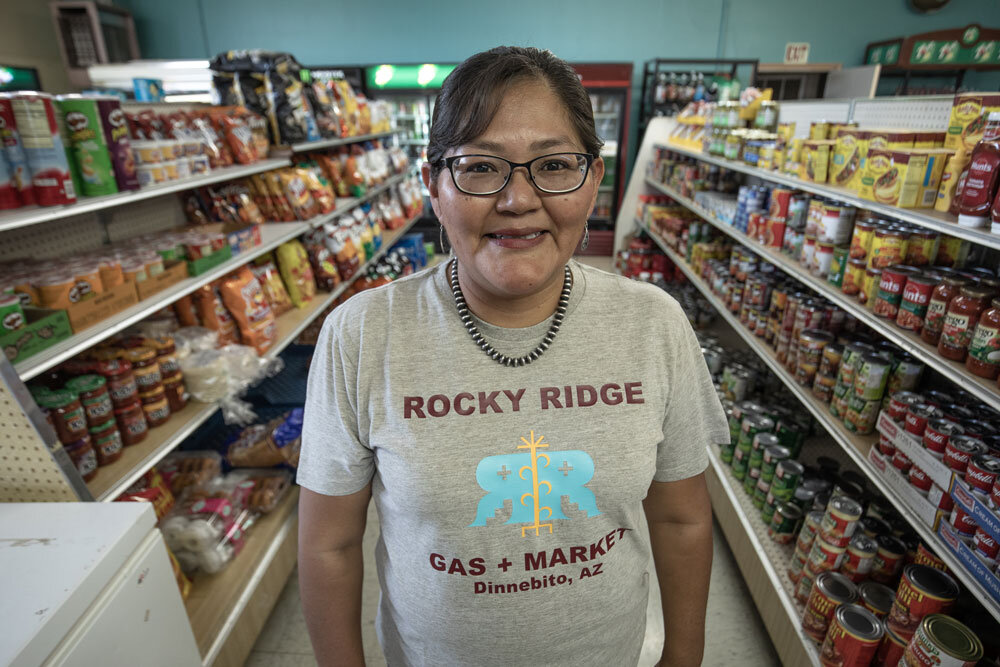Collaborating to build a Native economy
Rocky Ridge Gas & Market is housed one-mile down a dirt road in a rural area of the Navajo Nation. It’s so rural that larger companies don’t deliver their products to the store. Instead, Germaine Simonson, the owner, drives nearly two hours to pick up products for her customers.
“I’m not on a major road so a lot of distributors are not going to come to me,” Simonson said. “There are a few companies that I have to meet either in Tuba City or I have to drive more than two hours to Flagstaff for certain products.”
While the location isn’t ideal for business efficiency, it’s one that Simonson is learning to work around because the location of the grocery and gas station is what makes the business so important. “We’re located in the middle of the community, so the biggest reward is being able to remain in operation, so the community has a place to go that’s close by,” Simonson said.
When she took the store over in 2018, she knew the community needed it. Many of the residents can’t drive the two hours for products and count on Rocky Ridge Gas & Market to stock what they need.
Germaine Simonson, Rocky Ridge Gas + Market, Photography by Raymond Chee
Although the challenges of running a rural business compliant with the Navajo Nation business regulatory environment can be frustrating, Simonson said the business is worth it because she’s bringing opportunities to the community that wouldn’t exist without the store. And not just food and gas. In 2019, just four-months before the COVID-19 pandemic would shut down access to the Navajo Nation, Simonson launched her first website featuring pre-packaged Grandma Baskets, a novel way for off-reservation family members to purchase food and amenities for family members in Simonson’s community.
A self-sustaining Native economy
Simonson graduated from the Change Labs Business Incubator in 2019 with eight other Native entrepreneurs, and quickly recognized there was another critical asset she had to offer: her physical space. A study published by Change Labs in 2020 demonstrates the difficulty of obtaining land on the Navajo Nation for conducting business, a primary barrier to local startups and a key constraint for business growth. As such, with the extra space at Rocky Ridge Gas & Market, Simonson wants to create a space for local artisans to sell their work, a place where small businesses can get their start, and a place where the community to learn new skills, such as yoga.
“I’m working to create a hub of some sort and it’s a lengthy process,” she said.
Simonson’s goal is already becoming a reality. Rocky Ridge Gas & Market collaborates with another Navajo run business, AlterNativEats, a mobile fresh food truck run by Carlos Deal, also a 2019 graduate of the Change Labs Business Incubator.
Carlos Deal, AlterNativEats
Cherilyn Yazzie, Coffee Pot Farms, Photography by Raymond Chee
Through the store, Simonson and Deal provide an array of fresh food options that range from veggie and fruit bento boxes to organic salads and plant-based lunches. But the collaboration of Navajo owned businesses doesn’t end there. AlterNativEats gets some of their produce from Chi’shie Farms, a local Navajo farm run by Tyrone Thompson, a 2020 graduate of the Change Labs Business Incubator, and also Coffee Pot Farms, run by Cherilyn Yazzie.
“You’re looking at Navajo-owned businesses in rural parts of the Navajo Nation trying to support each other and help each other out,” says Simonson.
It’s a good model of self-sustainability in Native economies, a model that Chi’shie Farms works hard to promote, and also a clever solution to leapfrogging the physical infrastructure challenges Navajo entrepreneurs.
AlterNativEats food sold at Rocky Ridge Gas + Market, Photography by Raymond Chee
Competition versus collaboration
A key component of Rocky Ridge, AlterNativEats, Chi’shie Farms, and Coffee Pot Farms’ success is their willingness to collaborate. Yazzie has a history of viewing fellow business owners as collaborators versus competitors. Coffee Pot Farm actively provides training for its peers with an eye towards future partnerships. “If we’re going to be sovereign, we have to work together and we can’t be bringing in our personal egos,” says Yazzie.
Viewing your peers as potential collaborators is not just good for the community, it’s good business strategy, especially in a rural location where infrastructure is often lacking. “I’m not surrounded by resources,” says Simonson.
In addition to forging partnerships and sharing assets with other Navajo businesses, Simonson also hopes to inspire her younger employees. Her employees have started taking online classes and are finding ways to be successful without leaving the reservation.
“That motivates me because I want them to learn about business,” she said. “I’m trying to teach them some of these business essentials and I’m still learning too. I’ve never run a grocery store before. So, I’m constantly learning as well.”
Simonson is currently piecing together a legal framework for supporting other Navajo businesses with her store, a pathway that is muddied by the lengthy business site leasing process on the Navajo Nation. While it’s a lot of effort and trial and error, Simonson says owning a business on the Navajo Nation is worth it because it could mean that she can help a rural community like Hardrock.





